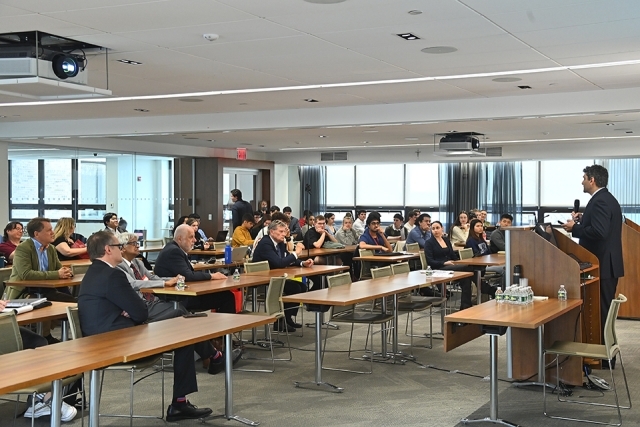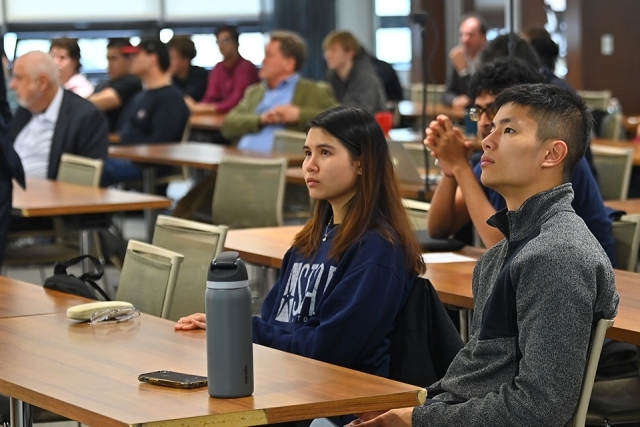

















One of the architects of Poland’s transition from a socialist economy to free-market capitalism recalled the economic challenges faced by the European nation in the late 1980s in a lecture at St. John’s University on April 11, 2024.
Alumnus Leszek Balcerowicz, Ph.D. ’74CBA, Deputy Prime Minister and Minister of Finance in Poland’s first post-socialist government, was the featured speaker at the Spring 2024 Henry George Lecture, presented by The Peter J. Tobin College of Business. Dr. Balcerowicz, whose economic transition plan came to bear his name, recalled efforts to introduce economic reforms to a nation that, along with other former socialist economies, was undergoing social, economic and political transformation.
Among other initiatives, the 1989 Balcerowicz Plan brought sweeping changes to Poland’s economic structure by reducing price controls, launching privatization, introducing new banking and tax regulations, cultivating foreign investment, and liberalizing international trade. Compared to other post-socialist peer countries, Poland, also endowed with relatively stronger internal economic structures, recovered its losses in gross domestic product (GDP), from a seven percent decrease in 1990 to a seven percent gain in 1995, before moving on a more stable growth trajectory. The Balcerowicz reforms in Poland proved to be impactful as the economy’s 500 percent annual inflation rate slowed to 35 percent by 1993, gradually coming under control in more recent years.
“It was a catastrophic situation,” said Dr. Balcerowicz, who in 1974 earned a Master of Business Administration degree with a concentration in Economics from St. John’s and a doctorate from the Central School of Planning and Statistics in Warsaw, Poland. “When they were forming the government, they did not have any problem finding candidates for the Minister of Culture or Foreign Minister, but there was a real shortage of candidates for the Minister of Finance position, as you can imagine.”
“When I accepted the position, I gathered a team of people I knew who had entered government with me,” Dr. Balcerowicz continued. “Without a team, you cannot solve problems, and there were many.”
Dr. Balcerowicz, 77, is believed to be the first alumnus to serve as a guest speaker for the Henry George Lecture series, which since 1981, has welcomed thought leaders to St. John’s to explore relevant issues in economics and economic policy. The lecture series pays tribute to Mr. George (1839–97), a 19th-century American political economist who advocated for progress, free trade, and social development.
The Henry George Chair is an endowed position at The Tobin College of Business at St. John’s, created in 1981 with a grant from the Robert Schalkenbach Foundation. Aleksandr V. Gevorkyan, Ph.D., Associate Professor, Economics and Finance, has held the Henry George Chair since 2019.
In introducing Dr. Balcerowicz, Dr. Gevorkyan said he was particularly interested since he also studies post-socialist transition economies.
“This is a rare opportunity for our university community to learn not only from one of the world’s most influential and leading statesmen, economists, and policymakers, but from someone who is also a graduate of one of our academic programs,” Dr. Gevorkyan said. “The set of macroeconomic reforms introduced by Leszek Balcerowicz and his team in Poland at the time later reverberated across the rest of the post-socialist region.”
Maciek Nowak, Ph.D., Dean, and Joseph H. and Maria C. Schwartz Distinguished Chair at Tobin, called Dr. Balcerowicz, “St. John’s most famous alumnus in Europe.”
“In my opinion, he is the most important figure in positioning Poland as the powerhouse of Eastern European economies,” Dean Nowak added.
Like many native Poles, Dr. Balcerowicz said he grew up antagonistic to socialist political and economic systems, which stifled free thought. He admitted he “never dreamt Poland would be completely independent and free” during his life.
That changed with the rise of the anti-authoritarian Solidarity labor movement in 1980. The group advanced the cause of workers’ rights through civil resistance and advocated for social change. Dr. Balcerowicz served the organization as an economic adviser. As popular support for the group grew, the government was forced to make concessions. Within a decade, socialism fell in Poland and across all of Central and Eastern Europe and the former Soviet Union.
“If there was anything that we could have done differently, it would have been to try to be faster, not slower, especially in the private sector, which was slowed down by political obstacles,” Dr. Balcerowicz recalled.
These days, Poland boasts the sixth-largest economy in the 27-nation European Union. Dr. Balcerowicz’s first term as Finance Minister ended in 1991; he served a second term from 1997 to 2000 before being elected Chairman of Narodowy Bank Polski, Poland’s central bank. He left government life in 2007 and now leads the Civil Development Forum, a think tank focused on enhancing global economic freedom and is a member of the Washington, DC-based financial consultancy, the Group of Thirty.
During his time in government, Poland’s economy opened to the rest of world, integrating it into the global market. “That was my mantra: promising to expand the scope of economic freedom and stabilizing the economy,” Dr. Balcerowicz said.
Related News
Q&A with Alicia Calabrese ’94SJC., LEAD Honoree
Alicia Calabrese ’94SJC, Principal of Floral Park Memorial High School, will be among several alumni honored by The School of Education (TSOE) at the 15th Annual Leaders in Education Awards Dinner...
Q&A with Brenda Almendarez-De Bello ’06M.S.Ed., ’19Ed.D., LEAD Honoree
Brenda Almendarez-De Bello ’06M.S.Ed., ’19Ed.D., Principal of Tamarac Elementary School in the Sachem Central School District , will be among several alumni honored by The School of Education (SOE) at...
SOE Alumnus Honored by SAANYS
John Trotta ’26Ed.D., Assistant Principal at Polk Street Elementary School in the Franklin Square, NY, School District, was recently named 2026 New York State Elementary School Assistant Principal of...
